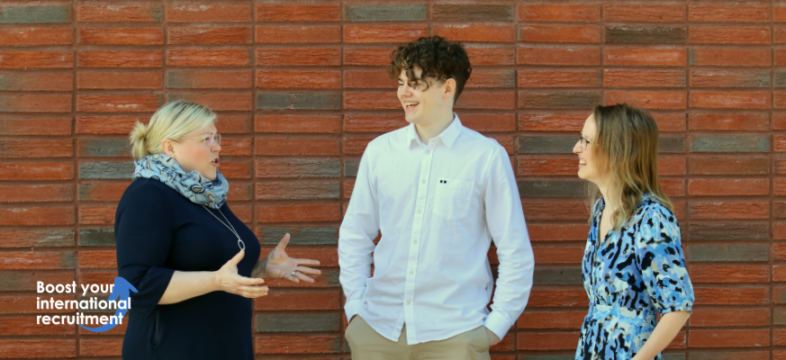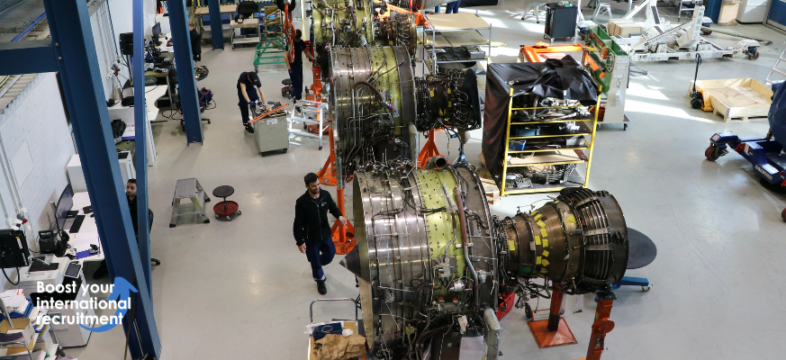
VTT makes successful recruitments from foreigners living in Finland
VTT conducts world-class international research in many fields, and its staff is equally international. Among its approximately 2,200 employees, representatives of 55 different nationalities can be found.
Anna Schoonover, who leads VTT’s Talent Acquisition and Employer Branding team, states that international recruitments have also been actively pursued this year. By mid-October of 2023, VTT had recruited about 230 employees and over 120 university trainees, nearly 90 of whom had a nationality other than Finnish.
Diversity increases innovation
VTT needs experts, particularly from various technical fields and natural sciences. The required skills range from programming quantum computers to manufacturing technology for new materials.
According to Schoonover, a diverse workforce is essential for creating innovative solutions within the work community.
– In an excessively homogeneous team, groupthink easily arises, where things are not creatively challenged. VTT’s management also considers it important to acquire diverse expertise.
International experts and degree students already living in Finland are a crucial “talent pool” for VTT in acquiring new skills. This year, more than half of VTT’s international recruits already lived in Finland.
Schoonover mentions that individuals from different backgrounds have qualifications acquired in different ways compared to native Finns, thereby bringing a new dynamic to the work community.
– International experts recruited from Finland have often worked in universities. They also often have international work experience, says VTT recruiter Cécil Fagerström.
Helping employees settle in Finland
VTT also recruits experts directly from abroad for roles ranging from research-level positions to professors. Sanna Downing, head of VTT’s Mobility team, notes that these recruits usually have strong work experience from several countries and established international networks.
– We financially support foreign experts coming to Finland, for example, by reimbursing moving or temporary accommodation costs up to a certain limit, Downing explains.
VTT uses an external service provider for international recruitment to assist employees with practical matters such as official registrations and opening bank accounts.
– Families are also assisted in arranging school and daycare matters for their children, Downing adds.
VTT aims to retain and commit international experts to their workplace. One factor that increases retention is the employment of the spouse in Finland.
– We currently have a pilot project underway to promote this, Downing says.
VTT also facilitates settling in Finland by organizing so-called relocation training for international experts, providing practical information about Finnish society, customs, and work culture.
– One of next year’s focus areas is to get international experts more actively involved in VTT’s staff clubs and other activities, Downing says.
Most jobs can be done in English
Sanna Downing has worked at VTT for a long time and notes a clear shift in the recruitment policy towards internationalization.
– Previously, perhaps only half of the job advertisements were in English. Now, all of the advertisements are in English if the job can be performed in English, Downing compares.

Fluent written and spoken Finnish is currently required at VTT mainly for some administrative tasks, such as handling legal matters or reporting state grants.
In addition to employees with higher education degrees, VTT also takes in many trainees in the final stages of their studies. Many of them are foreign students studying in Finland.
Some trainees stay at VTT in permanent positions. This is an effective recruitment method, especially in technical fields with fierce talent competition.
– For example, there is a high demand for machine learning experts, and they may not necessarily have the specific skills that VTT needs. In such cases, it may be easier to take in trainees and train them to become the required workforce, Schoonover says.
Trainee stayed to work at VTT
Henry Blue moved with his family from Canada to Finland five years ago and studied computer science at the University of Helsinki after high school. After an internship at VTT, he stayed on to work part-time.

Blue works on a project mapping the future telecommunication networks at VTT. Half of the 18-member team are non-native Finns.
– In an international organization, transparency is crucial. At VTT, communication materials for human resources, our team, and the entire business area are in both Finnish and English. This way, everyone knows what’s going on, Blue says.
Boost your international recruitment
In this series, we highlight good practices and lessons learned from companies and organizations that invest in the growth and competitiveness of their organizations by recruiting international talent. We want to support and encourage Finns and Finnish organizations to create a truly open, diverse, and equal work culture.
More information: Johanna Larsson, johanna.larsson@helsinki.chamber.fi



